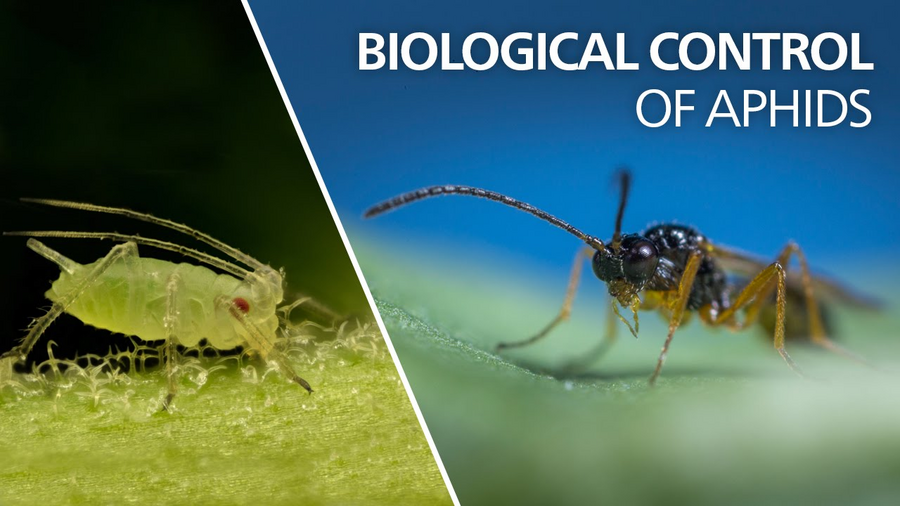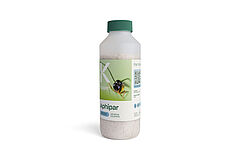
Aphid control with the parasitic wasp Aphidius colemani
Aphidius colemani is a parasitic wasp used for biological pest control. This species belongs to the Braconidae family and is primarily known for its effectiveness in controlling aphid populations in various agricultural and horticultural environments. Aphidius colemani is widely used in the biological control of aphids.
Aphidius colemani is used for the control of the following pests:
- Cotton aphid (Aphis gossypii)
- Green peach aphid (Myzus persicae)
- Tobacco aphid (Myzus nicotianae)
The natural enemy Aphidius colemani is available at Koppert as Aphipar.
Aphidius colemani products
Best conditions for use of Aphidius colemani
The parasitic wasp Aphidius colemani is most effective between 20 and 25°C (68 and 77°F). The effectivity is reduced at temperatures above 30°C/86°F.
How to use Aphidius colemani
The parasitic wasp is available in a bottle (Aphipar).
- Spread the material on rock wool slabs or in Diboxes
- Make sure the material remains dry and is not moved from its introduction site for at least a few days
The dosage of Aphipar depends on climate, crop and aphid density and should always be adjusted to the particular situation. Start introduction preventively soon after planting of the crop. Introduction rates typically range from 0.25-4 per m2/release. Releases should be repeated at least 3 times. Consult a Koppert advisor or a recognized distributor of Koppert products for advice on the best strategy for your situation.
Behaviour of parasitic wasp Aphidius colemani


Aphidius colemani has a very effective searching behaviour, which enables the wasps to track down and parasitize aphids, even when they are at low density. The behaviour of the female during egg-laying is typical of the Aphidiidae. First the host is examined by drumming with the antennae. This gives the wasp the information about whether the aphid is the right species, and whether it has not been parasitized before. If both criteria are met, then the second phase of parasitization will start. The female stands on outstretched legs and bends her abdomen forward beneath the thorax and between her legs. By moving her abdomen forward, she pierces the aphid with her ovipositor and deposits an egg. All this happens in less than half a second. Apart from the parasitization itself, the disturbance of the aphid population by the presence of the parasitic wasp also has an effect: the alarmed aphids secrete a warning substance, which affects the entire population, often causing aphids to drop from the leaf and fall to the ground. Although many aphids die as a result, many will survive and migrate to other plants to begin new colonies. To avoid becoming covered in their secretions, the parasite will not readily enter very dense aphid colonies.
Life cycle and appearance of Aphidius colemani
Female Aphidius spp. deposit an egg in an aphid in which four larval instars subsequently develop. Once larval development is complete the larva spins a cocoon inside the aphid cuticle, causing it to swell. The cuticle turns from a hard, leathery brown to a golden yellow casing, known as a mummy. Parasitized aphids turn into golden brown mummies after 7-12 days, depending on the temperature. Four to six days later the new wasps will emerge. An adult braconid wasp leaves this mummy via a round hole. The colour and form of the mummy do not, however, provide a reliable key to the species of wasp within: many braconid wasps that parasitize aphids produce a mummy similar to that of Aphidius spp. The aphids do not die at once but usually continue to feed and secrete honeydew. Second and third instar aphids are preferred, but all stages can be parasitized, including winged aphids. Parasitized fourth instar aphid nymphs and adult aphids will produce offspring for two more days, but if an aphid is parasitized in a younger stage there will be no reproduction. A male wasp has slightly longer antennae, a rounded abdomen that is shorter than the wings, and is black with dark brown legs. A female has a more pointed abdomen that is as long as the wings, is equipped with an ovipositor, and is black, with light brown legs.



















